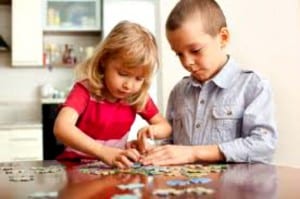
Data for the study came from a nationally representative survey that used a test called the Wechsler Preschool and Primary Scale of Intelligence (WPPSI). The WPPSI is a commonly-used exam for measuring the cognitive skills that contribute to general intelligence, including spatial ability. Nearly 850 children, aged four to seven, took part in the study. The researchers analyzed the children’s results on the Block Design subtest of the WPPSI, in which the children attempted to reproduce 2D designs with different-colored cubes. The researchers also evaluated survey data from the children’s parents about the children’s playtime behaviors and other activities.
Children who played the most with blocks, puzzles, and board games had higher scores on the Block Design test, indicating stronger spatial reasoning skills. Children who played with these sorts of toys six or more times weekly had better scores than children who played three to five times weekly and children who never played with blocks, etc. Several factors were associated with stronger spatial performance. Children from low-socioeconomic levels tended to have lower scores than children in middle- and high-socioeconomic levels. Boys had better spatial scores than girls, but only when the test scores accounted for other cognitive skills like vocabulary and working memory. The researchers report that activities like drawing, riding a bike or skateboard, playing math games, or listening to stories were not associated with better spatial scores.
More research is needed to fully understand the connection between spatial reasoning and spatial play. The findings could lead to new intervention tools for children with limited spatial reasoning abilities.
Jamie Jirout, lead researcher and psychological scientist at Rhodes College, says that “Our findings show that spatial play specifically is related to children’s spatial reasoning skills. This is important because providing children with access to spatial play experiences could be a very easy way to boost spatial development, especially for children who typically have lower performance.”
This research is published in the journal Psychological Science.
Previous news in sensory processing:



 © 2025 Unyte Health US Inc.
© 2025 Unyte Health US Inc.